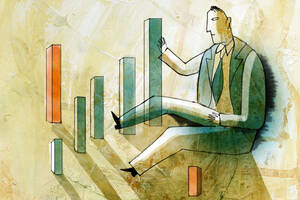Consider the following experiment: Two groups of college students are instructed to taste identical jellybeans and rate the flavors. Participants in one group are told to record their initial reactions. Those in the second group are told to think hard before rating the flavors and then to explain their choices in writing.
Forty minutes later, the experiment is repeated to see which group is likeliest to change their preferences. It makes sense that the students who put the most thought into their decisions will stand pat, right? Instead, Loran F. Nordgren, an assistant professor of Management and Organizations, and Ap Dijksterhuis, a professor at Radbound University in the Netherlands, found just the opposite. Turns out, too much analysis leads to inconsistent decisions.
Why does this happen? The authors argue that deliberation distracts consumers from the most relevant information at hand. They say that someone asked to scrutinize jellybean flavors might prefer chocolate one time and lemon the next. “Deliberation introduces noise into the decision-making process,” Nordgren says. “Thinking too much somehow brings us away from our true preferences.”
That may not matter so much when the object is inexpensive and does not stay with us very long, like a jellybean. But what about big-ticket items that we expect to enjoy for months or years, like artwork or an apartment? Those are exactly the sorts of acquisitions we are likeliest to deliberate about most—and, Nordgren argues, become dissatisfied with later.
Split-second Satisfaction
Nordgren says the best—and most consistent—decisions are made very quickly, by tapping into our intuition. We can decide whether a shirt looks great or a neighborhood looks safe in milliseconds. “It is analyzing why we like something that leads us astray,” he observes.
Nordgren is interested in how consumers make decisions. His latest study with Dijksterhuis follows an earlier one in which the authors found that complex consumer decisions about cars and furniture were best made without too much conscious thought. Consumers did a better job rating cars when they were distracted with word puzzles than when they consciously focused on the problem, for example. The authors concluded that deliberation acts like a mental spotlight, focusing attention on a narrow aspect of a decision instead of the entire problem.
The earlier study looked at one-time decisions. In the latest study, the authors set out to determine whether analytical consumers would make the same choices if given the opportunity. Consistent preferences are important, they argue, because some consumer decisions need to have enduring value. A bathing suit is expected to look attractive all summer; a redecorated living room is expected to look good for years.
As expected, they found that people who made quick decisions based on their gut feelings made more consistent choices. Whether rating Chinese ideograms or jellybeans, subjects asked to make seemingly snap decisions were more likely to replicate their choices when the experiment was repeated.
Of course, consistency is merely one element of consumer satisfaction. Shoppers who reliably choose low-quality goods are not making the best decisions; it is easy to imagine they will become unhappy with their selections over time. A poorly made swimsuit may flatter now, but be in tatters before Labor Day.
To discover the impact of decision-making styles on accuracy, the authors asked subjects to view eight paintings. Half were high-quality paintings from the Museum of Modern Art in New York, half were inferior works from the Museum of Bad Art in Boston. Seventy-three subjects were divided into two groups, deliberators and non-deliberators, and asked to rate the paintings twice. The authors found the two groups were equally capable of assessing the quality of the art, but that the non-deliberators made more consistent choices.
But is deliberation always a hindrance? The answer to that question depends on the complexity of the consumer decision, Nordgren says.
The authors asked ninety subjects to rate six apartments based on written descriptions. Half the apartments were described by three attributes: location, price, and size. Descriptions of the remaining three apartments included six additional attributes, for instance, whether they had carpeting, terraces, or a train nearby. The authors found that deliberators and non-deliberators made equally consistent decisions when asked to judge the apartments based on just three variables. But when asked to take nine attributes into account, the non-deliberators were more consistent in their preferences.
Trust Your Instincts
Nordgren and Dijksterhuis concluded that deliberation disrupts the natural weighting of information. When there is little information to consider, deliberation does not matter. As information becomes more complex, deliberators weigh the information differently from one time to the next, leading to inconsistent decisions.
The message for consumers is to avoid over-thinking big, complex decisions, Nordgren suggests. That does not mean, for example, that house-hunters should buy the first house they like. But after narrowing their choices by critical decision rules, such as location and price, consumers should trust their first impressions.
Nordgren says his research should “relieve consumers of the burden to feel like important decisions can only be made after careful reflection.” The prescription for better decision-making, he says, “is not to deliberate.”
Nordgren, Loran F., A.P. Dijksterhuis. 2009. “The devil is in the deliberation: Thinking too much reduces preference consistency.” Journal of Consumer Research 36:39–46.


